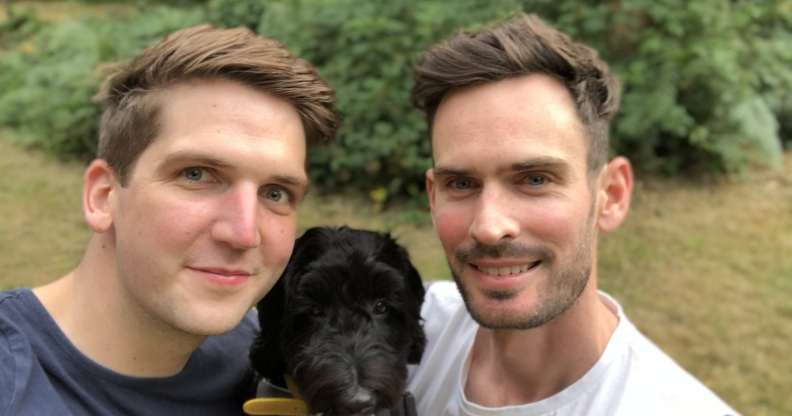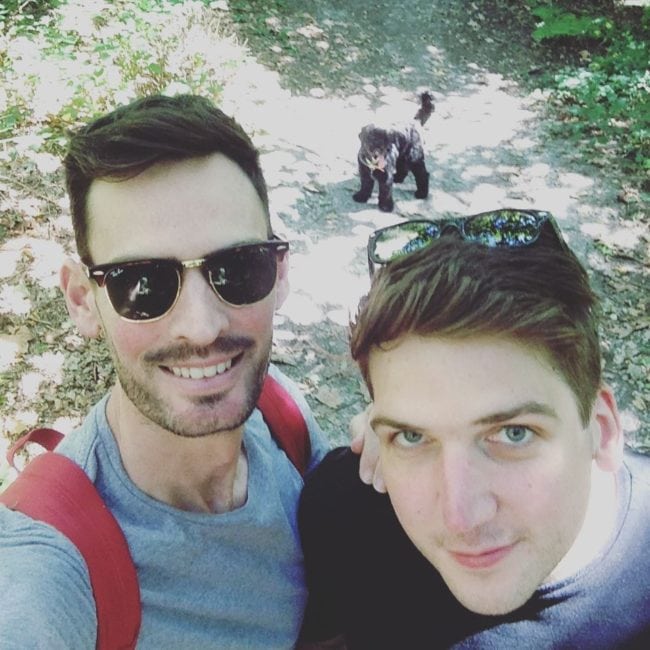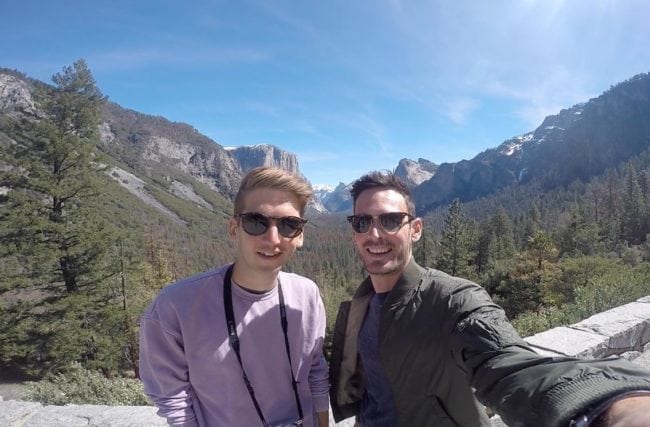Gay man facing deportation petitions Home Office for more transparent visa procedures

Stephen (L), Rusty (R) and their dog Oscar (Courtesy of Rusty Goodall)
An Australian gay man is preparing to say goodbye to his British partner and their dog after the Home Office rejected his visa application—but first, he is petitioning for a change in the application process.
Rusty Goodall and his partner Stephen Buck have amassed more than 75,000 signatures to a Change.org petition addressed to the Home Office and Secretary of State Sajid Javid.
The petition was set up in May after nearly a year had gone by since submitting a visa application and hearing nothing about it, all the while being prevented from working or leaving the country.
A response finally came more than a year later, on July 24, and it was devastating for the couple. The application was refused. Goodall was told he was “liable to be detained and removed” and that he had a month to leave the country.
He claims the Home Office has made a wrongful assessment of their situation. “This is ruining our lives,” he told PinkNews.
Goodall first moved the UK in 2007 as a working holidaymaker. “I fell in love with London,” he said, describing how Australia stopped feeling home to him. He had to go back when his visa expired, but he returned to the UK in 2012 on a few occasions, before being awarded an entrepreneur visa in November that year that was valid until March 2016.
By then, Goodall had met and fallen in love with Buck. Once Goodall’s visa expired, the couple decided to try living together in his hometown of Gold Coast, in Queensland. It didn’t work out, as Buck struggled to find a job and the couple felt the atmosphere there wasn’t as supportive of same-sex couples as London.
They moved back to the UK in May 2017 and, a month later, Goodall submitted a request for a family visa to extend his stay in the UK “on the grounds of private life in the UK,” as the partner of a UK citizen, which required the couple to have lived together for at least two years prior to the date of the application.

Rusty (L) and Stephen (R) walk their dog Oscar, a Cockapoo they’ve been caring for since July last year (Courtesy of Rusty Goodall)
Having met via Tinder in March 2014, Goodall and Buck moved in together in Balham, south London, the following year, as an Instagram post from February 3, 2015 shows. The couple said they also provided bank statements showing they were paying rent from a joint account in support of their claim.
The Home Office stated in the rejection letter, reviewed by PinkNews, that there was insufficient evidence to support their claim and that the earliest date they could verify their co-habitation was January 2016—thus the couple failed to meet the two-year requirement.
A Home Office spokesperson did not specifically answer a question about the Instagram post counting as evidence, simply indicating that caseworkers consider “a range of documentary evidence” when assessing applications. “Every visa case is assessed on its own merits in line with Immigration Rules,” the spokesperson told PinkNews.
In the letter, the Home Office listed another issue justifying their decision. To be considered for “leave to remain on the grounds of private life,” an applicant may have “lived continuously in the UK for less than 20 years,” provided “there would be very significant obstacles to the applicant’s integration into the country to which he would have to go if required to leave the UK.”
At this point, the visa application ceases to be an opportunity for the partner of a British citizen to settle down in the country and becomes a matter of providing sufficient evidence to justify the couple’s wish to live in the UK instead of moving elsewhere.

(Courtesy of Rusty Goodall)
According to the Home Office, Goodall—an Australian gay, white man—would not face significant obstacles if he went back to his home country. Despite reports of occasional homophobic attacks and anti-LGBT attitudes, Australia guarantees rights to LGBT+ people and Goodall maintains family relationships and a source of income in the country, the Home Office found.
“The Secretary of State has the right to control the entry of non-nationals into its territory and Article 8 does not mean individuals can choose where they wish to enjoy their private life when it can be reasonably expected for them to continue their private life elsewhere,” the letter stated.
The comment refers to Article 8 of the European Convention of Human Rights, which protects people’s right to a private and family life, home and correspondence, insofar that this is “in accordance with the law” and “in the interests of national security, public safety or the economic well-being of the country, for the prevention of disorder or crime, for the protection of health or morals, or for the protection of the rights and freedoms of others.”
The Home Office did not respond to a question regarding the article’s interpretation. It did however suggest to Goodall that he and his partner could easily move elsewhere if they wanted to stay together. “It is open to your partner to return with you where you can fully enjoy your rights as a citizen,” the letter stated.
As for the attitudes to same-sex couples in his hometown, the Home Office stated that “Australia is a large country where it could be possible for you to relocate to a different area where you feel it is more accepting”—seeing no apparent contradiction in advising someone to live where his support network is, and subsequently advising them to move away from it.
Goodall could appeal the decision in six months’ time, but he would have to do so from Australia. His other option is to marry his partner—a decision that they’d feel forced into, Goodall said.
The two could marry either in Australia, where same-sex marriage was finally legalised via a referendum last year, or elsewhere—just not in the UK. He’d then be able to apply again for a visa, but still with no certainty of being allowed into the country.

